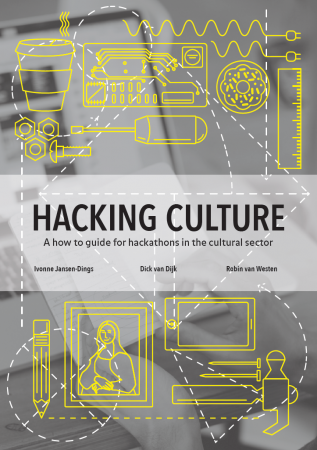ACTIONS
- Protect and safeguard cultural and natural heritage
- Learning and educational opportunities
- Cultural participation/social inclusion
- Sustainable tourism
- Support research
- Employment (recruiting, training, safety)
- Energy consumption, greenhouse gas emissions
- Waste management and reduction
- Transport (forms of, energy use)
- Commercial activities including copyright and IP
- Governance and management
- Security, disaster preparedness, risk reduction
- External partnerships and collaborations
- Toolkit/framework/roadmap
- Case studies
Hacking Culture: a how-to guide for hackathons in the cultural sector

Intended Audience
Cultural sector interested in organising hackathons
- I. Jansen-Dings, D. van Dijk and R. van Westen, Waag Society
“A hackathon is not a one-size-fits-all format that suits every purpose. It can bring insights, inspiration and ideas. But its success depends on you.
Based on the experience with organizing six hackathons in the Europeana Space project and the pre-existing experience with project partners, we created a how to guide, exploring the use of hackathons in the cultural sector and helping you to get started with organising one yourself. This publication intends to share the lessons we learnt for the realization of a successful event.”
Avaiable in
- English
SDGs LINKAGES
The resource can be used to develop activities that support a number of SDG targets, including: 4.4 (skills for work, both for employees and participants), 4.A (safe and inclusive and effective learning environments), 8.2 (diversification and innovation for economic productivity), 8.3 (promote job creation and enterprise). Depending on the topic of the hackathon, it may support social inclusion (10.2) and inclusive decision making and participation in addressing challenges (16.7). The intellectual property implications of hackathons are discussed and support SDG 16.10 (access to information and protecting fundamental freedoms). It can also contribute towards 17.17 (cross-sector partnerships).
Click on the SDG Target to discover Our Collections Matter indicators
-
Our Collections Matter indicators:
- Number of young people and adults in skills-development activities and programmes drawing on collections, for employment, decent jobs and entrepreneurship.
- Increase in number of young people and adults in such programmes.
- Number and proportion of staff who have received training in the last year, to better support their contribution to the SDGs.
- Programs and processes in place to ensure the availability of a skilled workforce.
-
Our Collections Matter indicators:
- Number and proportion of education facilities that are child, disability and gender sensitive.
- Proportion of education facilities that provide safe, non-violent, inclusive and effective learning environments for all.
- Number and type of initiatives to improve effectiveness of learning environments.
- Support given to other education facilities to make them more inclusive and effective.
-
Our Collections Matter indicators:
- Number of innovation-driven projects that aim to enhance or add to the range of activities drawing on collections.
- Staff training initiatives aimed at innovation, skills for enterprise.
- Number of public-facing activities that make use of new or emerging technologies, involving collections.
-
Our Collections Matter indicators:
- Development-oriented policies in place for the range of activities, or development-oriented considerations are included in other policies.
- Number of micro-, small- and medium-sized enterprises supported.
- Number and proportion of formalised arrangements with micro-, small- and medium-sized enterprises.
- Total value of financial services or financial support provided to micro-, small and medium-sized enterprises.
-
Our Collections Matter indicators:
- Collections development to ensure that collections effectively meet the needs of all, irrespective of age, sex, disability, race, ethnicity, origin, religion or economic or other status.
- Number and proportion of educational and participatory programmes that promote participation irrespective of social or other status.
- Numbers and proportions of people making use of collections in relation to the demographic of the local population.
- Numbers and proportions of people involved in focused programmes aimed at promoting social, economic and political inclusion.
- Numbers and proportions of people from different demographic groups involved in decision-making processes relating to collections and collections-based institutions.
- Number and types of partnerships that build relationships with marginalized groups, individuals and communities.
-
Our Collections Matter indicators:
- Proportions of positions (by sex, age, persons with disabilities and population groups) in public institutions (national and local legislatures, public service, and judiciary) compared to national distributions.
- Proportion of population [audience/users/non-users] who believe decision-making is inclusive and responsive, by sex, age, disability and population group.
- Decision-making addresses societal, environmental and economic challenges related to the community, considering short-term and long-term risks and opportunities.
- Decision-making draws on diverse backgrounds, viewpoints and interests, reflecting a broad base of stakeholders, and working to promote inclusion and provide effective services for all of society.
-
Our Collections Matter indicators:
- Adopt and implement constitutional, statutory and/or policy guarantees for public access to information.
- Plans in place, and plans implemented to enhance public access to information relating to collections.
- Plans in place, and plans implemented to support fundamental freedoms, in line with human rights, national and international agreements and legislation.
- Plans and procedures in place for public access to information relating to the operation and management of collections-based institutions.
- Complaint mechanism in place for public to use where public access to information and fundamental freedoms not supported or fulfilled.
-
Our Collections Matter indicators:
- Amount of United States dollars committed to public-private and civil society partnerships.
- Number and/or increase in number, and diversity of local, national and regional multi-stakeholder (public, public-private and civil society) partnerships that address the SDGs drawing on collections, or that otherwise involve collections-based organisations and institutions.
